Straight Line Crazy
Ralph Fiennes’ towering performance as megalomaniac Robert Moses who changed the face of New York as we know it is worth the price of admission.
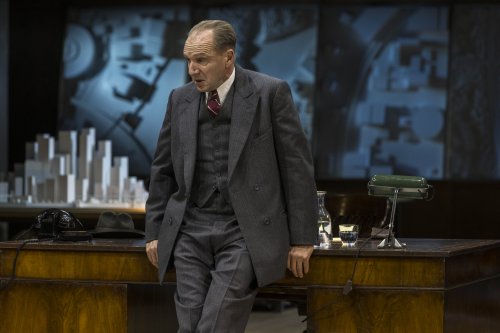
Ralph Fiennes as city planner Robert Moses in a scene from David Hare’s “Straight Line Crazy” at The Shed’s Griffin Theater (Photo credit: Kate Glicksberg)
[avatar user=”Victor Gluck” size=”96″ align=”left”] Victor Gluck, Editor-in-Chief[/avatar]
Every once in a while, the right actor is found for the perfect historical role. Take for instance, Julie Harris as Emily Dickinson, James Earl Jones as Paul Robeson, Hal Holbrook as Mark Twain and Audra McDonald as Billie Holiday. Add to that list Ralph Fiennes’ titanic performance as builder and city planner Robert Moses in David Hare’s latest London import, Straight Line Crazy, with eight out of 11 original cast members of the London Theatre Company’s 2022 production. Co-directors Nicholas Hytner and Jamie Armitage convert what could have been a dense civics lesson into a riveting and enriching evening of theater.
Playing the man nicknamed “the Power Broker” in Robert Caro’s monumental Pulitzer Prize-winning biography, Fiennes is arrogant, pugnacious, determined, superior, monomaniacal, aggressive, and obsessed. The play also makes it clear that he was a bigot, a racist and an anti-Semite even though he was born Jewish. His reason for making the Southern State Parkway overpasses too low for buses was to keep out people of color at Jones Beach and he broke his promise to Governor Al Smith to build a railroad stop for the same reason.
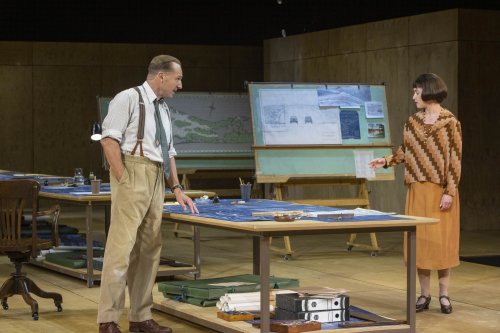
Ralph Fiennes as Robert Moses and Judith Roddy as Finnuala Connell in a scene from David Hare’s “Straight Line Crazy” at The Shed (Photo credit: Kate Glicksberg)
Fiennes’ bigger than life performance paints a three-dimensional portrait of a man who was a visionary but who couldn’t change with the times or listen to other people. He believed that people didn’t know what they wanted until they were presented with it. He also believed that the car was the future, never guessing that it would eventually be the enemy of the cities. He may have built 627 miles of expressways, doubled the green space in New York City to 36,000 acres, and added 658 playgrounds but to do this he moved 250,000 (mostly Black and Brown people) out of their homes.
While Hare’s play is structured like two separate one acts on the same theme, Act 1 set in 1926 and Act 2 taking place in 1955, the play successfully demonstrates the rise and fall of Moses, once the most powerful man in New York State. It also uses various narrators who directly address the audience pulling us into the action, journalist and activist Jane Jacobs, office manager Finnuala Connell and architect Mariah Heller. Some of the characters like Jacobs, Governor Al Smith and actress and activist Shirley Hayes were real people while other characters are invented; some of Moses’s actual pronouncements appear in the play, while others are invented by the author.
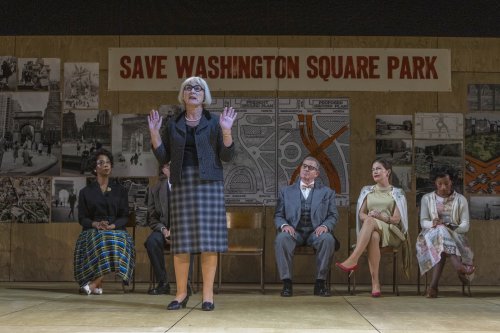
Helen Schlesinger as Jane Jacobs (standing) and cast of David Hare’s “Straight Line Crazy” at The Shed (Photo credit: Kate Glicksberg)
Set in 1926, the first act demonstrates Moses in action in the early days of his career as head of the Long Island State Park Commission, a job he is using to attempt to build the Northern and Southern State Parkways and Jones Beach. Unfortunately, he is “straight line crazy” defined as a city planner who “wanted to put a straight line between any two points and build where his ruler went.” This brings him into conflict with the rich landowners on Long Island who don’t want him building parkways through their orchards and estates. His staff also worries about the lawsuits concerning his beginning to build parkways before the governor has signed the bill appropriating the money, something Moses does not worry about, saying that once they have been built, no one will ask for them to be removed. Mainly set in his office at Belmont House in Babylon, L.I, the first act also has Moses verbally fencing with the fictitious landowner Henry Vanderbilt and the very real Gov. Al Smith who was one of his defenders.
By the second act set mostly in his office on Randall’s Island, 29 years later in 1955, Moses’ power is beginning to wane and the tide is turning against his dictatorial methods of working. Activist and journalist Jane Jacobs who specialized in city planning (and who he never met) proves to be his nemesis in his plan to build a highway through Washington Square Park and dividing it in half on the way to his unbuilt Cross Manhattan Expressway through Broome and Grand Streets in Soho. His Cross Bronx Expressway having been declared a disaster, civic groups are forming to oppose his latest plans. Now his closest staff member Finnuala Connell with him all these years objects to his not listening to the public, the community and his critics.
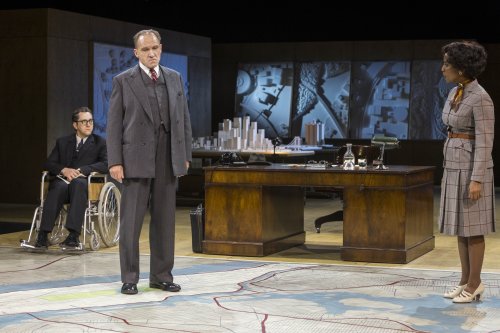
His newest employee, Mariah Heller, a young outspoken Black woman trained as an architect resents how his Bronx highway dislocated many of her relatives and objects to his requiring her to lie to the public at a town meeting in Greenwich Village. Although Moses can’t see the handwriting on the wall (particularly when former First Lady Eleanor Roosevelt joins the opposition against him), all his closest employees do. Moses defends his latest plans saying that we have built a city where highways run north and south but the traffic gets stuck trying to go east and west. Finnuala counters with the fact that “the clean people” that he is building his projects for are white people who can afford to own cars which are no longer the answer to the city’s transportation needs.
Helen Schlesinger (from the London cast) is excellent as Jane Jacobs, passionate and irate at the possible loss to the city of one more neighborhood that is doing fine without Moses’ intervention. We watch as Judith Roddy’s urbane Finnuala Connell goes from his chief adherent to his strongest critic. Danny Webb as Governor Al Smith is a hilarious character, a hard-drinking, straight-shooter whose Irish street roots are evident in every word he says. Not seen until the last act, Alisha Bailey’s Mariah Heller makes a very strong impression as she stands up to her boss and tells him what no one else will say to his face, that he is out of touch with public opinion and the way the city works now. As his leading draftsman, the soft-spoken Ariel Porter, Adam Silver makes his presence felt as a man who demeans himself for the sake of his boss.
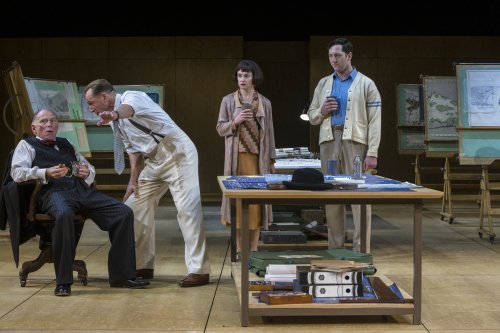
Danny Webb as Governor Al Smith, Ralph Fiennes as Robert Moses,Judith Roddy as Finnuala Connell and Adam Silver as Ariel Porter in a scene from David Hare’s “Straight Line Crazy” at The Shed (Photo credit: Kate Glicksberg)
Using a thrust stage for the first time in The Shed’s Griffin Theater with the audience sitting on three sides, Bob Crowley’s sets come and go, beautifully creating offices, meeting spaces and a palatial home with the minimum of time and effort while at the same time filling up the large stage with realistic designs. His costumes perfectly depict the 1920’s and the 1950’s. The sound design by George Dennis and the original music by George Fenton are redolent of the two eras. Mextly Couzin’s subtle lighting for The Shed production never draws attention to itself but focuses attention on just the right location in each scene.
Ralph Fiennes’ towering performance as a megalomaniac who changes the face of New York as we know it is worth the price of admission. With his puffed out chest and nose in the air remaking himself physically, he creates a biographical portrait which will go down in the theater annals. Co-directors Nicholas Hytner and Jamie Armitage keep all the data and speechifying fascinating despite what could be the dryness of the material. And let’s not forget David Hare’s achievement to place the 30 year career of builder Robert Moses front and center on stage without overwhelming us with facts and figures but creating drama out of real life confrontations. Straight Line Crazy may just prove to be the dramatic high point of this theater season.
Straight Line Crazy (through December 18, 2022)
The Shed and London Theatre Company
Griffin Theater, The Bloomberg Building, 545 W. 30th Street, between 10th and 11th Avenues, in Manhattan
For tickets, visit http://www.theshed.org or http://www.todaytix.com/nyc/shows/26032-straight-line-crazy
Running time: two hours and 40 minutes with one intermission






I was pleased to see this insightful review of what was definitely the best play I’ve seen this season. I’ll be following this reviewer.